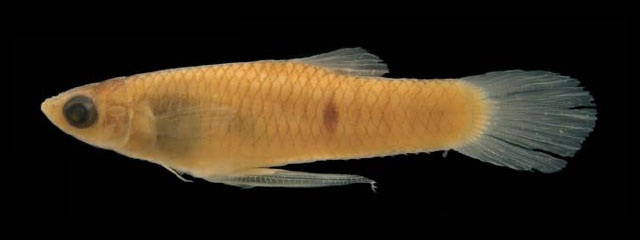| Poeciliidae (Poeciliids), subfamily: Poeciliinae |
| 2.8 cm SL (male/unsexed); 3.7 cm SL (female) |
|
benthopelagic; freshwater |
| South America: Rio Juquiá, a tributary to the drainage of the rio Ribeira de Iguape in São Paulo, Brazil. |
|
Dorsal soft rays (total): 7-8; Anal soft rays: 9-11; Vertebrae: 31-32. Diagnosed autapomorphically by the rectangular tip of hook on left half of gonopodial appendix (vs. rounded tip). Can be differentiated from its congeners except Phalloceros megapolos, Phalloceros spiloura, Phalloceros malabarbai, Phalloceros alessandrae, Phalloceros buckupi, Phalloceros uai, Phalloceros anisophallos, Phalloceros pellos, and Phalloceros reisi by the female urogenital papilla curved to the right, located laterally (vs. slightly left turned and with a lateral ramus or straight located along midventral line) and border of the anal aperture in contact with the first anal-fin ray or very close to it (vs. separated from first anal-fin ray by the female urogenital papilla). Differs further from its congeners except Phalloceros spiloura, Phalloceros uai, Phalloceros anisophallos, Phalloceros pellos, and Phalloceros reisi by the absence of the right hook and presence of the left one (vs. absence or presence of left and right hooks); and gonopodial appendix asymmetrical, its halves different from each other; right half wider than left one (vs. gonopodial appendix symmetrical; its halves similar to each other). Can be separated from Phalloceros spiloura by the absence of a caudal peduncle spot (vs. presence of caudal peduncle spot); from Phalloceros uai by the presence of a wide and square-shaped lateral spot in large specimens (vs. absence of such spot); from Phalloceros anisophallos by the lateral spot in adult females elliptical to roundish, but never forming a vertical bar (vs. lateral spot very narrow, forming a vertically elongated bar covering up to the length corresponding to two scales length in horizontal direction and 2-4 scales in vertical direction); from Phalloceros reisi by lateral spot always present and evident not covering the length corresponding to more than two scales length in horizontal or vertical directions (vs. lateral spot absent or small and discrete not covering the length corresponding to one or two scales length in horizontal or vertical directions) (Ref. 76852).
Description: Pectoral fin with 7 branched rays; longitudinal series of scales 28-30; transverse series of scales 7 (Ref. 76852). |
|
|
Least Concern (LC); Date assessed: 07 November 2018 Ref. (130435)
|
| harmless |
Source and more info: www.fishbase.org. For personal, classroom, and other internal use only. Not for publication.

